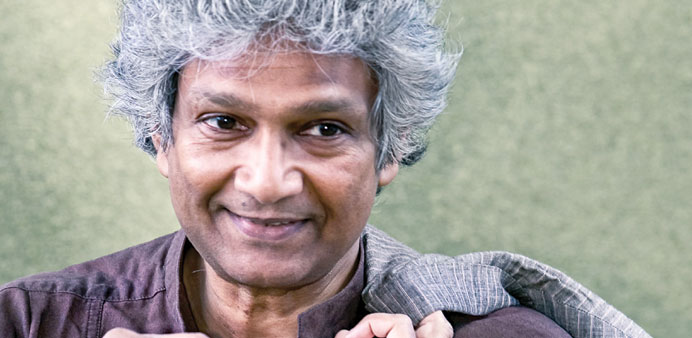Umer Nangiana
It is a novel narrated in short stories and Vasantha, the cab driver, is your personal guide through the post-civil war North and post-Tsunami South of Sri Lanka. Just pick up Noontide Toll and you would find yourself in the island country, trying to cope with the trauma of the 30-year long civil war and more than 30,000 deaths in the 2004 tsunami.
Such is the clout of Romesh Gunesekera’s writing. The Sri Lankan-born British author, who was a finalist in the Man Booker Prize for his novel Reef in 1994, through a fictional character, Vasantha, a clerk-turned driver, in his recent collection of short-stories, takes readers on a tour to the country that is trying to emerge anew from the an exacting civil war.
Besides giving outsiders a peek into the difficult times that the country found itself in, Gunesekera’s book provides an insight into the lives of people living through these tough times.
“It is a book of an individual trying to understand how you deal with the trauma of the past and face the future. I hope it would give insight into the difficulties in living at a time like this for an ordinary person,” the writer tells Community in a chat after his talk at the Georgetown University during his first-ever visit to Qatar.
Born in Colombo in 1954, Gunesekera grew up in Sri Lanka and the Philippines, where his father was a founder of the Asian Development Bank. He moved to England in 1971 and currently, lives in London.
His first book Monkfish Moon, a collection of short stories reflecting the ethnic and political tensions that have threatened Sri Lanka since independence in 1948, was published in 1992 and shortlisted for several prizes.
Set in the post-civil war and post-tsunami Sri Lanka, his recent book in a way examines if the root causes that triggered the long war, ending in 2009, have been addressed. He travels to areas previously inaccessible and pictures them and their inhabitants in his fictional stories brilliantly.
“The earlier two to three years were very difficult; the trauma is still there. There are different views on how one deals with it, and of course, the change of directions that seem to be signalled by the government this year is perhaps, a hopeful sign,” says Gunesekera, adding the root causes are larger issues that need to be taken care of without wasting much time.
“In a sense, those are very large issues of wealth, how it is distributed and economic benefits and so on as well as issues to do with discrimination and languages. They are still there and these need to be addressed,” the author emphasises.
About stories in his book, he says these are fictional and the main character is a van driver. The job of this man is to take people around. At the end of the war, there is much more travel going on around the country particularly, in areas where it was not easy to get to; in the North, for instance.
This man had the opportunity to take people to places that he had not been to before. The book is a collection of stories of what he sees when he takes people there and what they see.
In the second part, he travels to the south of the island where he goes to places he has been before, but meets people whom he has never come across before. For example, these are people who were soldiers in the war besides people who are coming in as tourists to the south.
Gunesekera manages to connect with his country that he has managed to keep intact despite living away.
“I suppose I travel to Sri Lanka a lot. In recent times, I think I have gone pretty regularly for short periods. The Sri Lankan diaspora is very widespread and, of all sorts. In a sense you have a whole country outside the country as well,” he says.
“Sometimes people, who are on the other side of the world know what is happening there. They have heard about what is happening on the street next to your street before you find out,” the writer says to explain how he managed to maintain it.
However, he says his connection with Sri Lanka differs from the sort of connection people, who are living there have endured.
“In some ways I feel more connected to Sri Lanka in recent years when I am writing a book particularly that is connected to it than I was when I was living there and thinking about something else,” he adds.
The writing scene in Sri Lanka, he says, has evolved in recent years. He has seen it develop from a very closed group of writers, but now the writer thinks there is a lot of interest in imaginative writing there.
“There are lots of people, who are interested in reading, and writing in all three languages: Sinhalese, Tamil and English. I think there is an interest in writing more about things than just the war. It is an interesting and fruitful period,” says Gunesekera.
“There was until recently a very dampening effect on some of the writers simply because of the political situation being very uncertain, particularly in non-fiction area, in journalism. It has been a very tough place for journalists in recent years,” observes the writer. However, he hopes things are changing as many things are opening up after the war.
Gunesekera believes a writer evolves. “I have been trying to write fiction for a very long time. It is a process of really developing your own writing styles. Each book draws different things from you as a writer,” says the prominent fiction author.
“You do not necessarily learn so much, but it becomes the art that you practice. It is like anything else whether you play a musical instrument, cricket or tennis or drive a car, the experience feeds into it,” he elaborates.
Good writing is a mixture of gifted qualities and learning the art. To some extent, everyone can write the same way as everyone can play music to a certain level. “There is a lot that you can learn and learn by doing, but obviously there is something else that has to happen which may not be something that anyone can give you,” says the award-winning writer.
How much does it help living in places like London in research for writing?
“These days it doesn’t really matter where you live if you want to do writing. It has more to do with the environment — whether it is conducive and makes sense to you as an individual or not. So it is purely a personal choice,” Gunesekera suggests.
“In terms of doing research and so on, I have written books that have been set in Sri Lanka, Mauritius, Philippines. These are places that I know a little bit about. Sometimes I had to do some research and sometimes I had to go there,” reveals the writer.
Gunesekera is working on a new book which is a novel these days, but wants to take his time. “I have no idea how long it will take, I have no idea when it will be done. And I am not in a rush in one sense. I am in a bit of rush in another sense as I get older,” he smiles.



